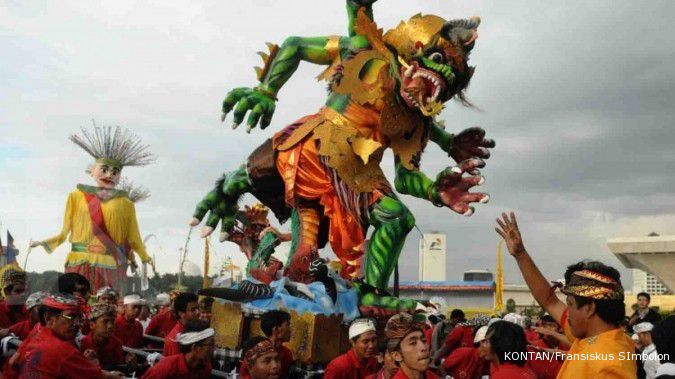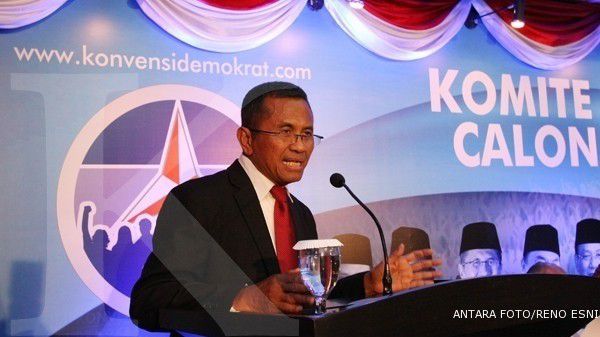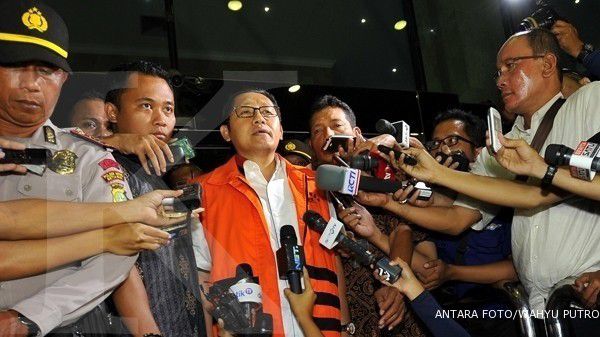JAKARTA. The flood disaster hitting the capital city seems to have become a litmus test for Jakarta Governor Joko Widodo to determine whether the once-obscure politician from Surakarta, Central Java, is deserving of being elected president.
But analysts say the calamity, and even attempts to sling mud at the governor, popularly known as Jokowi, for what his critics claim is his failure to prevent the floods, will not severely hurt him.
With some parts of the city remaining inundated and thousands of residents displaced, rivals of the Indonesian Democratic Party of Struggle (PDI-P) politician are taking advantage of the crisis and have stepped up their salvo against him.
National Mandate Party (PAN) founder and former presidential candidate Amien Rais, for example, called on Jokowi to apologize because of the severe floods.
While acknowledging that nobody would be able to eradicate floods from Jakarta in a short period of time, Amien said that offering an apology would be a sympathetic gesture for Jokowi to make.
Outspoken lawmaker Ruhut Sitompul of the ruling Democratic Party also accused Jokowi of failing to fulfil his election promises.
“Jakartans voted for him because of his promises to end the floods and traffic jams. But what we see today is that they are deteriorating. Well, we all now know the real quality of Jokowi,” he said.
The attacks, analysts say, would not undermine Jokowi’s electability for a number of reasons.
“First of all, flooding in Jakarta is an old problem. It has been the capital’s problem since long ago. Secondly, the problem is not exclusive to Jakarta. Many other parts of the nation have also been suffering from floods,” Indo Barometer executive director Muhammad Qodari said on Tuesday.
The issue in question is whether Jokowi was seen as doing the right thing to mitigate the disaster and cater to the needs of the flood victims.
“Jakartans are now closely scrutinizing Jokowi’s efforts to mitigate the disaster, handle the victims and take immediate actions to ease the floods. At the same time, his past policies and efforts to anticipate floods, such as dam renovations and river normalizations, are now being evaluated,” he said.
Pol-Tracking executive director Hanta Yuda said public sentiment toward Jokowi would not be negatively affected by his performance in handling the floods. “Our studies show that the factor that would cast the biggest impact on people’s opinions of certain political parties or figures is corruption, not floods.”
Hanta acknowledged that the media, which plays a significant role in driving opinion, would publish negative reports about Jokowi. “But it will not have a considerable effect, given the massive amount of positive media reports about Jokowi since he became governor about a year ago,” he said.
PDI-P politicians also responded to the criticisms coolly. “If Jokowi is attacked using the flood issue, that will just make him work harder,” PDI-P senior politician Hendrawan Supratikno said.
He reiterated that floods in Jakarta also involved many other stakeholders, particularly the central government and the administrations of neighboring areas such as Banten and West Java provinces.
A survey by Kompas daily found that Jokowi’s electability stood at 43.5 percent in December, making him the most popular potential presidential candidate. In its November survey, the Centre for Strategic and International Studies (CSIS) found that if an election was held on the day of the survey, Jokowi would secure around 34 percent of the popular vote.
If social media could be used to measure public sentiment toward Jokowi, the public seems to be increasingly polarized, with netizens in heated debates over Jokowi’s failings and achievements in handling the floods. It remains to be seen if the flooding could take a toll on Jokowi’s rating.
No pollster has conducted a survey on Jokowi’s electability since the floods, but Hanta and Qodari admitted it was possible that his rating would decline slightly.
Jokowi has continued to appear at the top of almost all potential candidate popularity surveys, although the PDI-P has yet to nominate him to officially represent the party in the election.
PDI-P secretary-general Tjahjo Kumolo previously said political attacks against Jokowi could be proof that it was better for the party to postpone its nomination, while some pollsters have said that Jokowi’s early nomination could instead boost PDI-P’s electability in the upcoming legislative election in April. (Bagus BT Saragih)
/2013/12/16/311524120.jpg)














